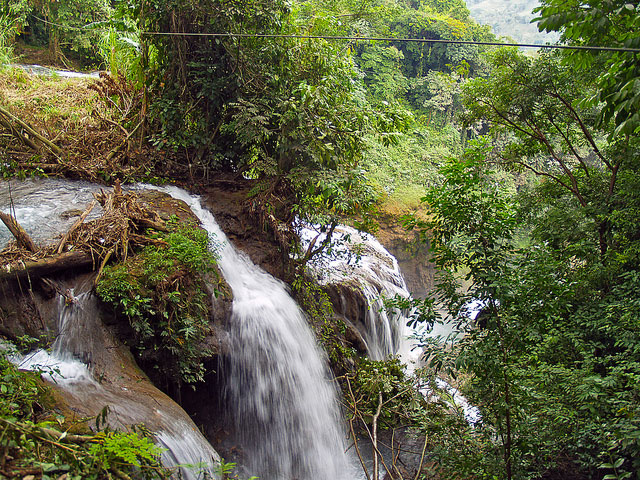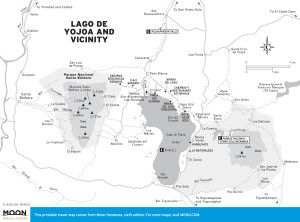
A zipline crosses right over the edge of Pulhapanzak Falls. Photo © Adalberto H. Vega, licensed Creative Commons Attribution.

Lago de Yojoa and Vicinity
Of the several balnearios along the Río Lindo, a tributary of the Río Blanco north of Peña Blanca, by far the most popular is the 43-meter-high, privately owned Pulhapanzak Falls (Cascadas de Pulhapanzak, tel. 504/2509-1322). The falls are located just off the road leaving Peña Blanca to the north, connecting to the San Pedro Sula highway. To get to the falls, take a bus from either Peña Blanca or San Pedro Sula, and get off at San Buenaventura, which is 12.5 kilometers from the San Pedro Sula–Tegucigalpa highway and 10 kilometers from Peña Blanca. From San Buenaventura, walk 1 kilometer to the signposted turnoff to the falls. If in doubt, ask a local to point the way.The dirt road dead-ends at a gate, where visitors pay an entrance fee of US$0.50. Beyond are a parking lot and a few small changing rooms to put on bathing suits. There is a broad pool along the Río Lindo, just above the falls, which is great for a swim—just don’t swim too close to the drop-off! On both sides of the river are plenty of shady places to take a rest.
To properly admire the falls, follow the steps down along the edge of the river to a viewpoint below. The land around this part of the river is private property and is still covered with dense forest, a visually pleasing background for the falls. Those interested in a naturalist explanation and exploring the cave behind the waterfall where Mayan artifacts are reputed to have been found can hire a guide for US$8 per person.
Warning: The wet, steep paths leading down and around the falls are treacherous, especially during rainy weather, requiring great balance and careful footing. People have literally fallen to their deaths here.
A zipline (“canopi”) zigzags across the river, with one thrilling cross just after the waterfall drop-off (US$22). There is also a children’s canopy on the other side of the river, where kids can zip down lines that are just a few feet off the ground. River tubing is also available (US$15), and the hotel will help arrange trips to nearby attractions such as the Joya Grande zoo (US$10), Cuevas de Taulabé (US$10), lunch at the lake (US$15), a visit to the El Cajón Dam (US$13), or a ride to D&D Brewery (US$2.50).
Back up by the gate is a snack bar/restaurant and large open field, where campers can stay for US$10 per person. Those looking for (a lot) more comfort can reserve one of the cabins (US$70 for 1–2 people, US$85 for 3–4). The area is usually packed on weekends and deserted during the week.
Between San Buenaventura and Peña Blanca is the hydroelectric power plant at Cañaveral. In front of the office are two sculptures from the Los Naranjos site, one a headless statue and the other a large dish, which were unearthed during the construction of the Río Blanco canal in 1962. Next to them is an example of one of the turbines used in the power plant.
Excerpted from the Sixth Edition of Moon Honduras & the Bay Islands.